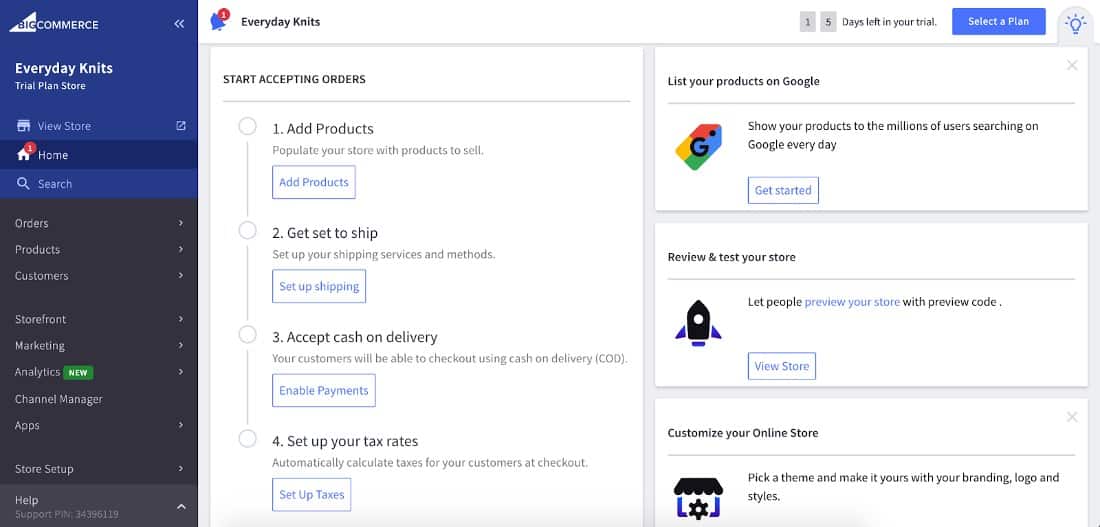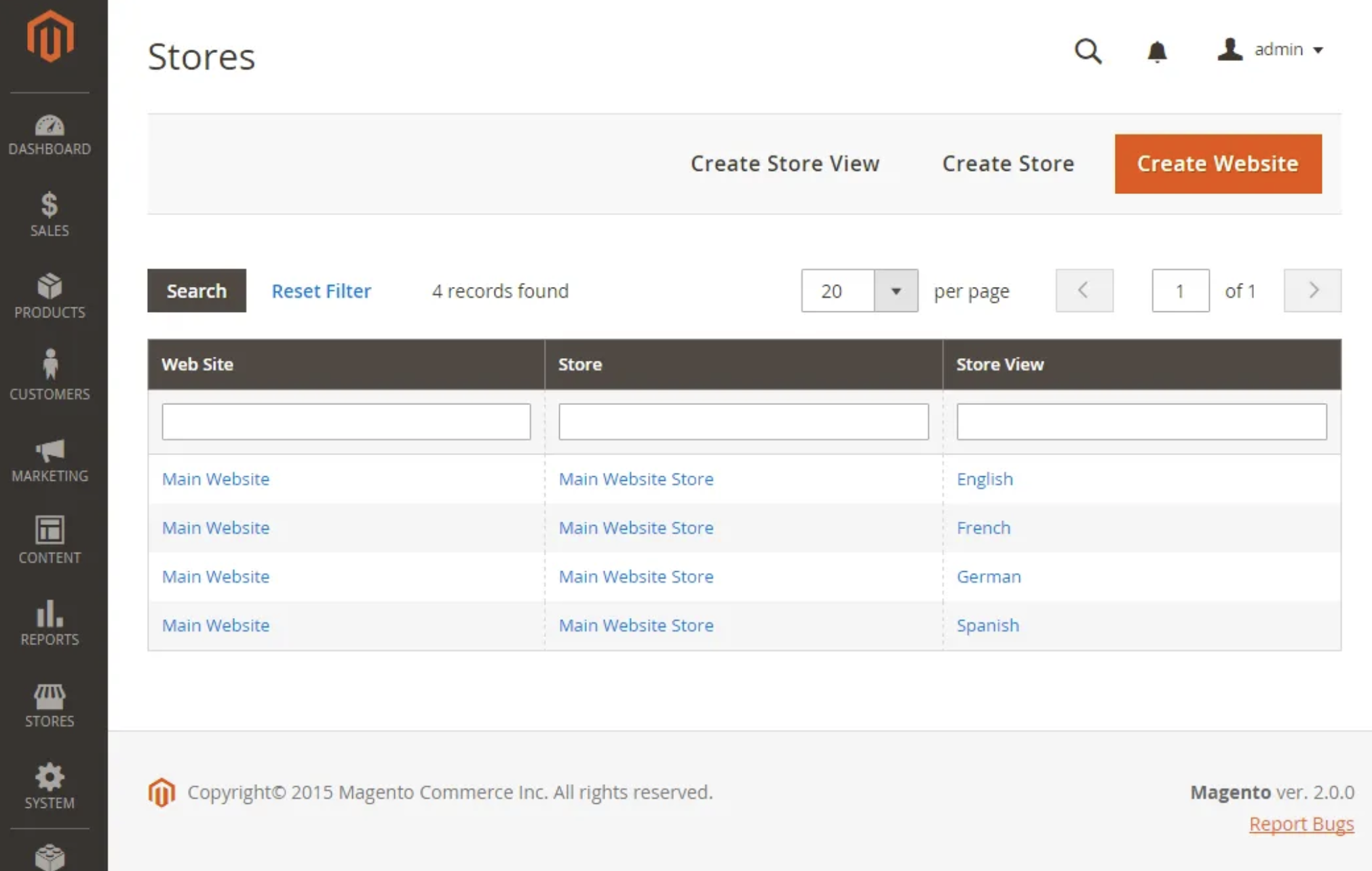
E-commerce has revolutionized the way we buy and sell products. With a constantly growing market, choosing the right ecommerce platform is crucial to the success of any business.
Below, we compare five of the best ecommerce platforms: Shopify, WooCommerce and BigCommerce, detailing their advantages and disadvantages to help you make an informed decision.

Comparison of 5 of the best e-commerce platforms
Shopify
28% of e-commerce worldwide is hosted on Shopify, according to statistics shared by Burst Commerce, which translates into 2 million merchants and 4.6 million websites online.
“Shopify merchants have a complete overview of activities from a single back office. You can focus on optimizing your online store, expanding your reach by selling on social media, or testing popular sales models like drop shipping”, they noted on the Shopify portal.

Pros
Ease of Use: Shopify is known for its intuitive and easy-to-use interface, allowing users, even those without technical knowledge, to set up and manage their online store without difficulties.
Customer Support: Offers 24/7 support via chat, email and phone, ensuring there is always someone available to help in case of problems.
Built-in capabilities: Shopify provides a wide range of built-in tools and features like SEO, email marketing, and data analytics, making it easy to manage all facets of your business from a single platform.
Integrations: It has an extensive app store that allows users to easily integrate third-party tools and services, such as inventory management systems, marketing platforms, and analytics tools.
AI: You can generate product descriptions with Shopify's Artificial Intelligence assistant.
Cons
Costs: Shopify plans can be expensive, especially for small businesses. In addition to the monthly cost, some apps and extensions also have additional fees.
Limited customization: Although Shopify offers several themes and templates, full site customization may be limited without development knowledge in Liquid, Shopify's own programming language.
Lack of strong multisite functionality: “Shopify is relatively weak in this area relative to its competitors. For example, Shopify does not offer the ability for a business user administrator to set up an additional site and share products across multiple sites,” Gartner noted.
Wix
VIX is ideal for entrepreneurs and small businesses looking for a simple but powerful solution to start and manage their online store. Its focus on ease of use allows users to focus on their business without worrying about technical complexity.

Pros
Flexible layouts: Wix offers a very flexible drag-and-drop editor, making it easy to customize the store layout.
Affordable plans: Offers a competitive pricing structure, with affordable plans for small businesses and entrepreneurs.
SEO Integration: Wix has built-in SEO tools that help improve your store's visibility on search engines.
Included Features: Many essential features are included without the need for additional apps, simplifying management.
Cons
Limitations in ecommerce: While great for general websites, Wix may be limited for larger ecommerce stores or those with complex needs.
Scalability capabilities: Not the best option for businesses that plan to grow significantly in the short term due to its performance limitations and advanced features.
Layout Control: While the editor is flexible, it can be overwhelming for those without web design experience.
BigCommerce
This platform is one of the challengers in Gartner's Magic Quadrant. “BigCommerce primarily sells to small and medium-sized organizations with an annual gross merchandise value (GMV) of less than $10 million. The majority of its clients are located in North America, with a growing presence in Europe and Asia/Pacific. BigCommerce primarily targets the retail and business/consumer services sectors, and has a presence in transportation, high-tech, and media”, they explained in the report.

Pros
Robust Features: BigCommerce offers a set of advanced tools that are ideal for small and medium-sized businesses that need more features.
No transaction fees: Unlike Shopify, BigCommerce does not charge transaction fees, which can be a big advantage for businesses with high sales volumes.
Headless architecture: “BigCommerce offers a low-code native store framework called Stencil and a no-code page builder. For headless applications, it offers a number of pre-integrated third-party front-end options that support PWA, FEaaS, CMS and DXP, and headless APIs for customers' own interfaces”, Gartner noted.
Scalability: It is highly scalable, making it suitable for businesses looking to expand quickly.
Cons
Learning curve: Due to its advanced functionalities, BigCommerce may have a steeper learning curve, especially for users without technical experience.
Costs: Their plans are more expensive compared to others, although they offer more integrated features, which may not be necessary for all businesses.
Design limitations: Although it offers customizable templates, the design editor is not as intuitive as Wix's.
Features for large enterprises: Some features are insufficient for large enterprises, especially in the area of role and permission management, complex catalog management, customization, and unified commerce.
Magento
Magento is one of the most robust and flexible ecommerce platforms available on the market. It is known for its ability to handle large volumes of products and transactions, making it ideal for medium and large businesses. Originally developed in 2008 and currently owned by Adobe, Magento offers a highly customizable and scalable solution for those looking to build a powerful, feature-rich online store.

Pros
Flexibility and customization: Magento, being an open source platform, offers great flexibility and customization possibilities, allowing developers to modify and adapt the store according to the specific needs of the business.
Scalability: It is ideal for large businesses and growing companies as it can handle a high volume of products and traffic without compromising performance.
Advanced Features: Magento comes with a wide range of advanced features, including inventory management, varied payment options, and robust SEO capabilities.
Active community: It has an active developer community that contributes extensions, modules and technical support.
Cons
Technical complexity: Requires advanced technical knowledge for installation, configuration and maintenance. It is not the best option for beginners.
Implementation cost: Although the Community Edition version is free, hosting, development and maintenance costs can be high.
Development time: Configuration and customization can be very slow, requiring considerable development and extensive testing.
Do you need support to develop your next e-commerce platform? At Rootstack, we have +14 years of experience supporting companies in their digital transformation. Contact us.

